emigration and immigration
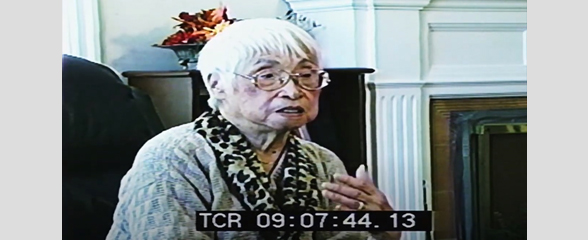
2007.006.071 Oral History Interview with Elsie Chang and Professor Jeffrey Barlow at Pacific University
There were two interviews recorded on this tape. In the first interview, Elsie Chang provides a personal view of Hazel Ying Lee, a female aviator who flew during the 1930s and 1940s. She discusses their close friendship, which began in China when they were young, and delineates the many fearless traits of her friend. Elsie also talks about her life in Portland and the discrimination she faced as an adult. She remembers the last time she saw Hazel and describes where she was when she first learned of her death. In a separate interview, Professor Jeffrey Barlow of Pacific University contextualizes racial and gendered landscape of early twentieth century Portland, Oregon and discusses the stereotypes and expectations with which Chinese American women such as Hazel would have had to contend. Prof. Barlow discusses how Hazel may have made the decision to become an aviator and how she was able to do so despite various constraints. These interviews are part of the Hazel Ying Lee & Frances M. Tong Collection and were conducted as part of the research and making of the documentary film, A Brief Flight: Hazel Ying Lee and the Women Who Flew Pursuit (2002), directed by Alan Rosenberg.
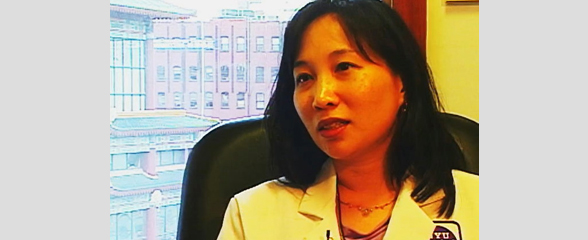
2014.036.001 Oral History Interview with Blanche Leung June 16, 2004
Blanche Leung, M.D., was born on April 16, 1970 in Queens, New York to immigrant parents from Hong Kong and Canton, China. She sits down to recount the immigration story of her parents, from when they left China as young children following the Communist changeover to their time in Hong Kong, Taiwan, Canada and the United States, where they ultimately settled in 1969. Her father was a pharmacist and her mother was a hematology lab manager. She talks extensively about the family pharmacy located on Lafayette and Walker Streets, which served as a focal point for the family. Blanche and her mother frequently went to assist at the pharmacy in addition to spending time in the Chinatown area for errands and extracurricular activities such as ping pong and Chinese School even though they lived in Elmhurst, Queens.
Her childhood relationship with the Chinatown community and the New York Chinese community evolved when she became a medical professional and served as a liaison between Chinese patients and other hospital staff to improve the quality of care. She would later open a practice in Chinatown and describes the interactions she has with her Chinese patients. The interview conversation transitions from talking about Chinese-speaking patients and Chinese language medical resources to her experiences during and after the 9/11 attack. Blanche describes the emotional and physical impact on Chinatown following the terrorist attack in the context of her patient care, diagnosis, and medical requests in addition to the change in the street scene in the aftermath. She concludes the interview with answers to questions regarding Chinatown rebounding from 9/11 and her intentions to continue her medical practice in Chinatown amidst the ever-changing demographics and geography of Chinatown.
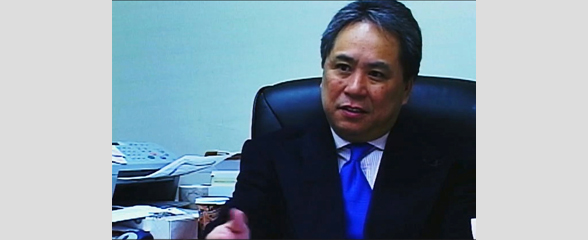
2014.036.013 Oral History Interview with Tony Wong April 1, 2004
Tony Wong, General Manager at Sino Television, was born and raised in Hong Kong. He immigrated to the United States to study broadcasting at both the undergraduate and graduate level. Tony recalls his initial struggles as a student coming from a poor economic background and how he eventually moved to New York City, receiving a job offer at NBC right after graduation. During his time at NBC and in Sino TV as a part-timer, Tony would learn a myriad of skills including production, directing, and programming. Tony would eventually move on to work at different companies before returning to Sino TV as a full-time employee. He would describe Sino TV’s area of operation, and programming variety, and emphasize their stance on being politically and culturally neutral regarding the different Chinese communities and political views. Later in the interview, Tony shares his thoughts on Chinese unity and stereotypical “passiveness†and observes a change in this following the 9/11 attacks. Tony notes that following the 9/11 attack, the Chinese community banded together to help local recovery and rescue operations and fundraised 1.5 million dollars for the World Trade Center Fund and the American Red Cross. He also highlights other efforts to create programs that promoted Chinese activism for not only disasters but also for political purposes.
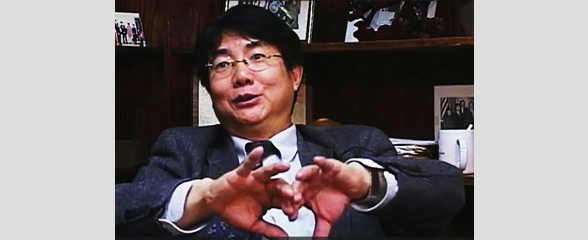
2014.036.014 Oral History Interview with David Chen July 10, 2003
During the interview, David Chen discusses his experience as a Chinese American activist and director of the Chinese-American Planning Council (CPC), and his theory of activism. When Chen was younger, he rarely spoke. He would always wait for someone else to say the right thing, to which he would then agree. One time, as a younger student, he was forced to present a project because two of his partners did not show up. One of his classmates expressed how well-spoken he was and at that moment, Chen realized that his voice could be heard. Chen believes that in order to be an activist for peace and justice, one must see the bigger picture. Effective activism should start with institutions because that is how change can be enacted. He believes that anyone can be an activist as long as they talk, remember, observe, and are skeptical of organizations. He states that while spontaneous change comes from the bottom, sustaining change comes from the top, more specifically, from organizations. Chen joined the Organization of Chinese Americans in order to advocate for what he wanted to stand for and speak freely on those subjects. However, he also believes that a successful organizer does not talk too much because activism is about observing the smaller issues. As an activist, he believes that trust must be gained from individuals. Chen agrees that the Asian American rights movement was inspired by the Civil Rights Movement. Overall, he believes that society as a whole has become more willing to change and hopes that individuals, especially young activists, continue to act, give voice, and intellectualize.
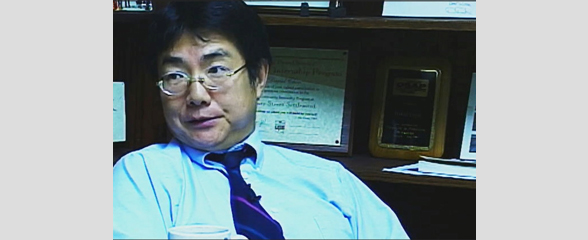
2014.036.015 Oral History Interview with David Chen July 13, 2004
In this interview, David Chen discusses his work at Chinese-American Planning Council (CPC) as an activist in New York City Chinatown. Chen is the director of CPC, a private organization started in 1965 serving the public and focusing on low-income immigrant families, mostly Chinese. Services offered include language classes, translations, daycare centers, job training for adults, senior citizen care, childcare, and Meals on Wheels. Prior to his work at CPC, Chen worked for the mayor in Chicago. While there, he constantly questioned why there was no Chinese funding. While in college, Chen studied to be a social worker and community organizer. He explains that he was not good at chemistry and did not want to pursue medicine or law like his parents expected him to. During college, he and his friends volunteered in Chicago Chinatown, which is much smaller than New York City. In Chicago Chinatown, Chen and his friends taught English classes but there were not many job opportunities in the community, so he decided to work for the government. On a visit to New York City, Chen fell in love with how densely populated and large Chinatown was and was told that there were many job opportunities available. He applied for a position at CPC as a youth director twenty-three years ago, accepted the role, and moved to New York City. Chen was part of "Project Reach", which was an at-risk prevention program for troubled kids. He describes Chinatown as a transient neighborhood in that there is constantly an influx of Chinese immigrants every few years. CPC serves those immigrants by helping them get entry-level jobs and helping them get their foot in the door. By doing so, he hopes that secure immigrants who have gotten aid from CPC would be able to help the next wave. Asked about his upbringing, Chen shares that he is from an upper-middle class family and that his father was an engineer. He was originally born in Shanghai but his family moved to Hong Kong while he was a baby. He came alone to the United States during his final year of high school and focused on school in order to avoid being drafted into the Vietnam War. The last part of the interview briefly covers 9/11. Chen notes that in the recovery and aftermath, Chinatown was largely ignored although it was an adjacent neighborhood to the World Trade Center. Chen also describes how important Chinatown is to tourism because of its restaurants and shopping venues.

2014.036.015 Oral History Interview with David Chen July 13, 2004
In this interview, David Chen discusses his work at Chinese-American Planning Council (CPC) as an activist in New York City Chinatown. Chen is the director of CPC, a private organization started in 1965 serving the public and focusing on low-income immigrant families, mostly Chinese. Services offered include language classes, translations, daycare centers, job training for adults, senior citizen care, childcare, and Meals on Wheels. Prior to his work at CPC, Chen worked for the mayor in Chicago. While there, he constantly questioned why there was no Chinese funding. While in college, Chen studied to be a social worker and community organizer. He explains that he was not good at chemistry and did not want to pursue medicine or law like his parents expected him to. During college, he and his friends volunteered in Chicago Chinatown, which is much smaller than New York City. In Chicago Chinatown, Chen and his friends taught English classes but there were not many job opportunities in the community, so he decided to work for the government. On a visit to New York City, Chen fell in love with how densely populated and large Chinatown was and was told that there were many job opportunities available. He applied for a position at CPC as a youth director twenty-three years ago, accepted the role, and moved to New York City. Chen was part of "Project Reach", which was an at-risk prevention program for troubled kids. He describes Chinatown as a transient neighborhood in that there is constantly an influx of Chinese immigrants every few years. CPC serves those immigrants by helping them get entry-level jobs and helping them get their foot in the door. By doing so, he hopes that secure immigrants who have gotten aid from CPC would be able to help the next wave. Asked about his upbringing, Chen shares that he is from an upper-middle class family and that his father was an engineer. He was originally born in Shanghai but his family moved to Hong Kong while he was a baby. He came alone to the United States during his final year of high school and focused on school in order to avoid being drafted into the Vietnam War. The last part of the interview briefly covers 9/11. Chen notes that in the recovery and aftermath, Chinatown was largely ignored although it was an adjacent neighborhood to the World Trade Center. Chen also describes how important Chinatown is to tourism because of its restaurants and shopping venues.
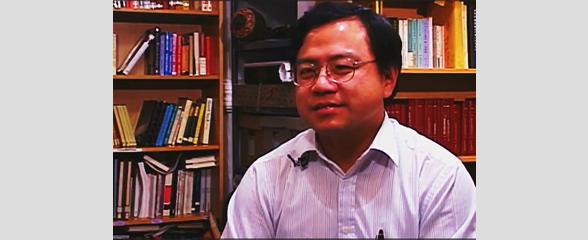
2014.036.016 Oral History Interview with Wing Ma November 7, 2003
Wing Ma (Ma Wing Guo) was born in China to a poor farming family who moved to Hong Kong as refugees when he was age two. Wing talks about his life growing up in Hong Kong with his mother working in the garment industry and his father working as a chef in Manila. He studied until post-secondary school before moving to the United States to train and work as an engineer. Wing would eventually join the garment industry as a factory owner, and describes the industry decline over time due to overseas competition. This would also lead to his own factory closure. He details workers pay, union benefits such as healthcare, and his involvement with union negotiations as a member and president of the Garment Manufacturers Association. Wing also talks about his involvement with other community organizations following his transition into the liquor industry, such as the Asian American Advisory Council under Peter Vallone and Community Board Three. He shares his experiences acting as a liaison between the government and the local community and shares some of the positive changes this brought to Chinatown. During the September 11th, 2001 attacks, he recalls being shocked and upset that he was unable to reach friends and loved ones. He talks about the effects of the attacks on Chinatown through his personal experiences as a building landlord. He recalls the mass exodus of tenants from the area and the difficulty in obtaining support from relief funds for the Chinatown community. He discusses the need for the government to subsidize and support businesses returning to the area to improve the local economy. He also encourages the Chinatown community to become more active and participate in local government or social work. He concludes with a discussion of his thoughts on the future of the garment industry and alternative job prospects for Chinatown residents.

2014.036.016 Oral History Interview with Wing Ma November 7, 2003
Wing Ma (Ma Wing Guo) was born in China to a poor farming family who moved to Hong Kong as refugees when he was age two. Wing talks about his life growing up in Hong Kong with his mother working in the garment industry and his father working as a chef in Manila. He studied until post-secondary school before moving to the United States to train and work as an engineer. Wing would eventually join the garment industry as a factory owner, and describes the industry decline over time due to overseas competition. This would also lead to his own factory closure. He details workers pay, union benefits such as healthcare, and his involvement with union negotiations as a member and president of the Garment Manufacturers Association. Wing also talks about his involvement with other community organizations following his transition into the liquor industry, such as the Asian American Advisory Council under Peter Vallone and Community Board Three. He shares his experiences acting as a liaison between the government and the local community and shares some of the positive changes this brought to Chinatown. During the September 11th, 2001 attacks, he recalls being shocked and upset that he was unable to reach friends and loved ones. He talks about the effects of the attacks on Chinatown through his personal experiences as a building landlord. He recalls the mass exodus of tenants from the area and the difficulty in obtaining support from relief funds for the Chinatown community. He discusses the need for the government to subsidize and support businesses returning to the area to improve the local economy. He also encourages the Chinatown community to become more active and participate in local government or social work. He concludes with a discussion of his thoughts on the future of the garment industry and alternative job prospects for Chinatown residents.
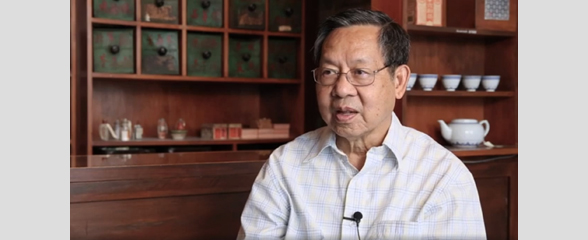
2016.033.009 The Family Journey of The Chiu Family
Tony Chiu discusses his life in America and how he grew his professional career as a research chemist. Chiu dedicated his adolescence and young adult years to his studies because he had no other choice but to study in order to become successful. Chiu discusses the hardships he had to face as a Chinese immigrant in the United States. English not being his first language prevented him from studying what he wanted to. His choice of chemistry was a result of necessity rather than choice. Chiu talks about his marriage with his wife, who was also hardworking and career driven. In this interview, Chiu explains how he co-parented with his wife and how they raised their children to be hard workers without pressuring them to succeed.
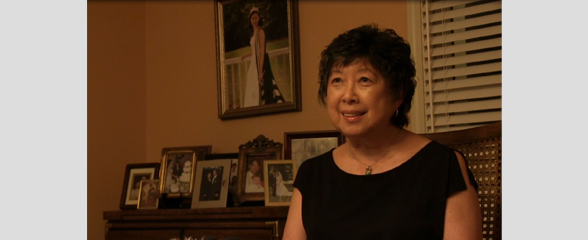
2016.037.008 Oral History Interview with Gilroy and Sally Chow 2015/12/21
In this interview of Gilroy and Sally Chow (interviewed separately), the couple talk about their relationship with food throughout their live. As second or third generation immigrants of an ethnic Chinese background who grew up in the American South, their interview reveals the way that Chinese food is passed down through generations as a powerful component of culture and the way it morphs over time to become apart of the multifaceted lives of immigrant families. Gilroy and Sally express the joy they find in cooking, the importance of cooking as a family value, and the way in which cooking plays a central role in their lives as they continue to recreate, innovate, and experiment with food.